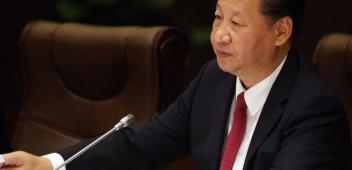How Biden's China doctrine can swing the pendulum back
A shift toward the center is more likely in coming months.
Originally published in Nikkei Asia Review.

Donald Trump's foreign policy often seemed guided by a simple rule: do the opposite of Barack Obama.
Trump's administration scorned the long-standing U.S. efforts to engage China and formally embraced the concept of great power competition. By the time COVID-19 hit, the U.S. and China had ended almost all efforts to cooperate on the great global issues.
Six months into the Biden administration and the pendulum has not swung back. Rather, Biden himself has promised "extreme competition." His toughness on China expresses rare domestic consensus in a still polarized nation and is more than matched by Beijing's rhetoric. Readouts from Deputy Secretary of State Wendy Sherman's recent meetings in China suggest a continuing diplomatic stalemate.
But we should not be surprised if, in Washington at least, the pendulum starts inching back toward the center as domestic imperatives shift and the administration grapples with more complex foreign policy issues.
The two great powers still share the same planet and their economies, despite mutual efforts to decouple, are stubbornly interlinked. Thus, according to Secretary of State Antony Blinken, the U.S. approach to China will be "competitive when it should be, collaborative when it can be and adversarial when it must be."
That is a neat formulation, but it begs the question of when the U.S. should be competitive, collaborative or adversarial. More to the point, how can these contradictory approaches be reconciled? As Biden's Indo-Pacific czar Kurt Campbell was asked recently, is the administration going to compete and cooperate with China on alternate days?
In response, Campbell was adamant that "the modern challenges of the 20th-century demand that we do both." The administration remained serious about cooperation and the two sides "must find common cause on existential issues."
Addressing the climate crisis ranks on par with China on Biden's priority list. Some argue that healthy competition is the answer because both powers want to enhance their ecological reputations. But cooperation is still necessary. It will take the U.S. industry much longer to reach net-zero emissions if it cannot adopt more advanced Chinese renewable technology.
Washington is trying to reconcile competing tensions by producing a coherent Indo-Pacific strategy. The interagency process will likely generate a more balanced assessment of U.S. interests than is currently possible in Washington's public domain.
The key organizing question is: what is the objective? For reasons of bureaucratic metrics alone, U.S. agencies will need to know how they can measure success. Competition is not an objective. There is a consensus that Washington should no longer aspire to making China a responsible stakeholder in the international system. But there is little agreement on what should replace this goal.
It is possible to anticipate the interagency debates by looking at what the leading protagonists said before they entered office.
In a 2019 essay "Competition without Catastrophe," Campbell and now National Security Adviser Jake Sullivan argued that because the U.S. cannot shape China, it should no longer try to define an "end state." Rather, the U.S. should aim for "a steady state of clear-eyed coexistence on terms favorable to U.S. interests and values." This entails "accepting competition as a condition to be managed rather than a problem to be solved" while pursuing "a set of conditions necessary for preventing a dangerous escalatory spiral."
Washington may no longer aspire to shape China, but it remains determined to defend the existing order. According to Secretary of State Blinken, "our purpose is not to contain China, to hold it back, to keep it down. It is to uphold this rules-based order that China is posing a challenge to." Blinken's remarks were at least partly directed at U.S. partners and allies who are readier to support the defense of the existing order than any anti-China agenda. But those states also want an order with guardrails that can limit escalation.
As U.S.-China competition escalates, the need to establish mechanisms for cooperation will also grow. Campbell and Sullivan prefigure this dynamic, faulting previous administrations with having "sought to cooperate first and compete second with China" and arguing that Washington should henceforth "lead with competition, follow with offers of cooperation and refuse to negotiate any linkages."
In an essay published shortly before they entered the White House, Campbell and Rosh Dashi, who has joined Campbell in the administration, focused on the future of the order in the Indo-Pacific. Preserving this "operating system" requires a policy mix. The U.S. should balance China militarily rather than seeking primacy and take steps to bolster the order's legitimacy. Importantly, it also requires "marginal buy-in from China."
Because Indo-Pacific states "realize it is neither practical nor profitable to exclude Beijing from Asia's vibrant future," the U.S. and its partners should "persuade China that there are benefits to a competitive but peaceful region organized around a few essential requirements."
Maintaining marginal Chinese buy-in to the regional order is a long way from having it become a global responsible stakeholder. But it would be a significant step back from extreme competition. Whether Beijing would be willing to take a similar step is another story.



